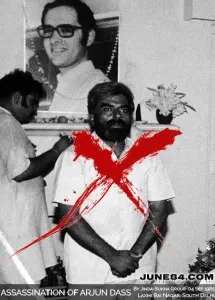The 1980s were one of the darkest decades in modern Indian history, marked by political turmoil, communal violence, and the devastating events of 1984. Among the figures closely tied to this turbulent period was Arjan Dass, a Congress politician whose name remains controversial to this day. His killing, often referred to as the Arjun Das assassination, is not just an isolated political event but a reminder of the anger, pain, and unhealed wounds of the Sikh community after the genocide of 1984.
Who Was Arjan Dass?
Arjan Dass was a Member of Parliament from the Indian National Congress and a known associate of Sanjay Gandhi. As a politician, he held influence in New Delhi and wielded power during a time when Sikh–state relations were deeply strained.
Following the anti-Sikh pogroms of November 1984, survivors and rights groups repeatedly named Arjan Dass as one of the individuals who played an active role in encouraging mobs against Sikhs. While thousands of Sikh men, women, and children were brutally killed, many political leaders accused of instigating the violence—including Arjan Dass—escaped punishment.
This lack of accountability transformed Arjan Dass from a politician into a symbol of state failure, fueling frustration and anger among Sikhs who felt abandoned by the justice system.
The Context Behind the Arjun Das Assassination
The Arjun Das assassination must be seen in the context of post-1984 India. The Sikh community was grappling with unimaginable trauma: homes destroyed, families shattered, and justice delayed or denied. Despite inquiries and commissions, little action was taken against those accused of leading the mobs.
On September 5, 1985, the situation reached a boiling point when Arjan Dass was shot dead in Delhi. Sikh militants claimed responsibility, framing it as an act of retribution for his alleged involvement in the massacre of Sikhs.
For many Sikhs, the assassination of Arjan Dass was not random violence—it was seen as justice delivered in a world where courts and governments had failed them. For the Indian establishment, however, it was treated as an act of militancy, used to justify further crackdowns on Sikh activists and ordinary citizens alike.
Political and Social Impact
The Arjun Das assassination sent shockwaves through India’s political circles. Leaders who had been implicated in the 1984 pogroms suddenly felt vulnerable. The government increased security for Congress politicians, and the killing was used to frame Sikh resistance as extremism.
At the same time, within the Sikh community, the assassination was viewed as symbolic. It represented the idea that no one could remain untouchable if they had blood on their hands. While mainstream media framed it negatively, for many Sikhs it reflected a deep truth: when justice is continuously denied, people will find their own ways of holding oppressors accountable.
Legacy of Arjan Dass and His Assassination
The story of Arjan Dass raises difficult but important questions:
-
Why did survivors’ testimonies about his role in 1984 go unheard for years?
-
Could the Arjun Das assassination have been avoided if the justice system had acted swiftly?
-
Why did so many powerful leaders escape punishment for decades?
Even today, the assassination of Arjan Dass is remembered not only as the killing of a politician but also as a reflection of a community’s despair. It highlights how impunity can fuel cycles of violence.
Remembering Through June 84
At June 84, the aim is not to glorify violence but to preserve historical truth. The platform documents incidents like the assassination of Arjan Dass so that future generations can understand the causes, context, and consequences of those turbulent years.
By archiving stories like these, June84.com ensures that Sikh history is not erased or rewritten. Instead, it gives voice to the martyrs, survivors, and events that shaped an entire generation.
Conclusion: Lessons from the Arjun Das Assassination
The assassination of Arjan Dass remains one of the most significant political killings of the mid-1980s. It cannot be separated from the larger narrative of the 1984 anti-Sikh genocide and the deep wounds it left behind.
Whether one views it as vengeance, justice, or militancy, the Arjun Das assassination carries a lesson: when systems fail to deliver fairness, resentment festers and erupts in ways that reshape history.
By remembering these events honestly, we not only pay tribute to those who suffered but also highlight the importance of justice, accountability, and healing.





